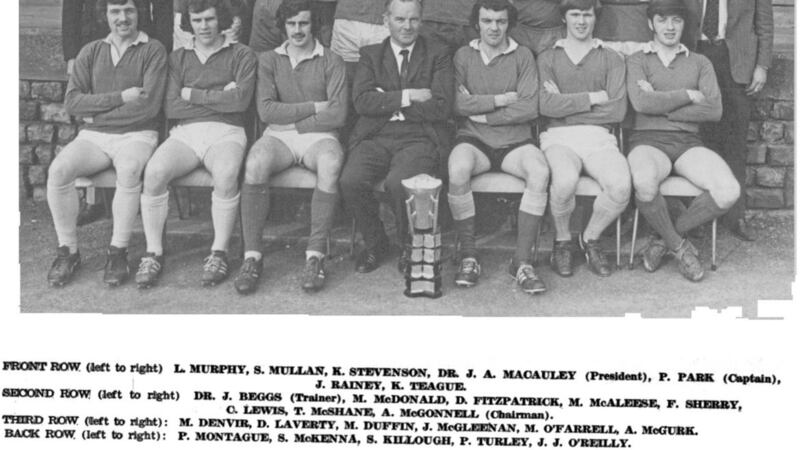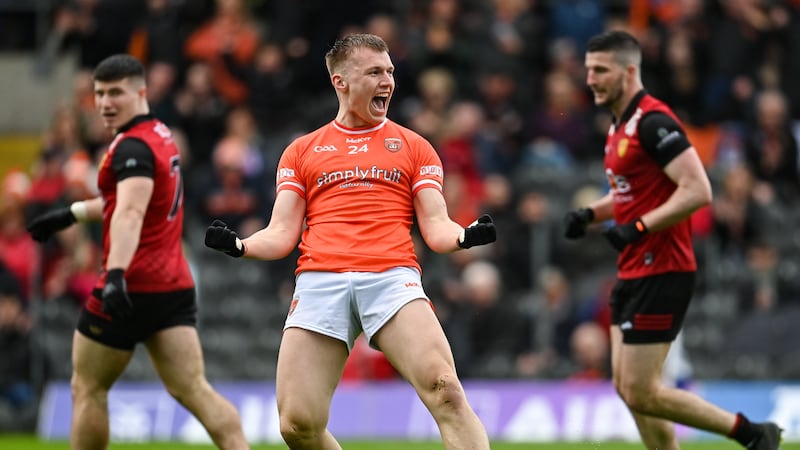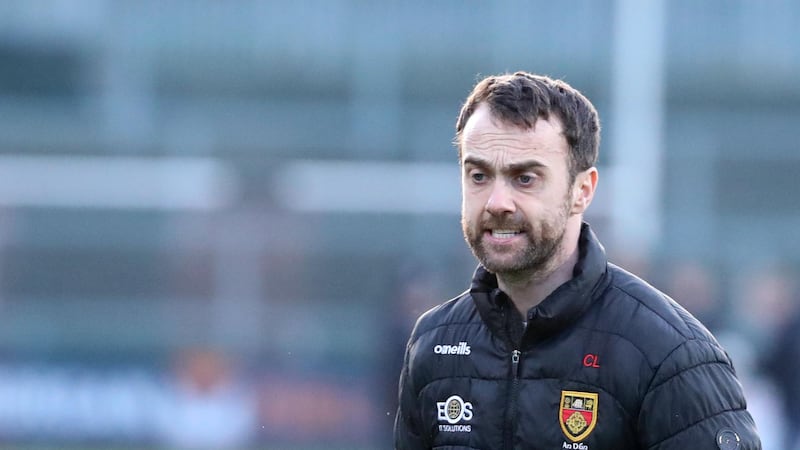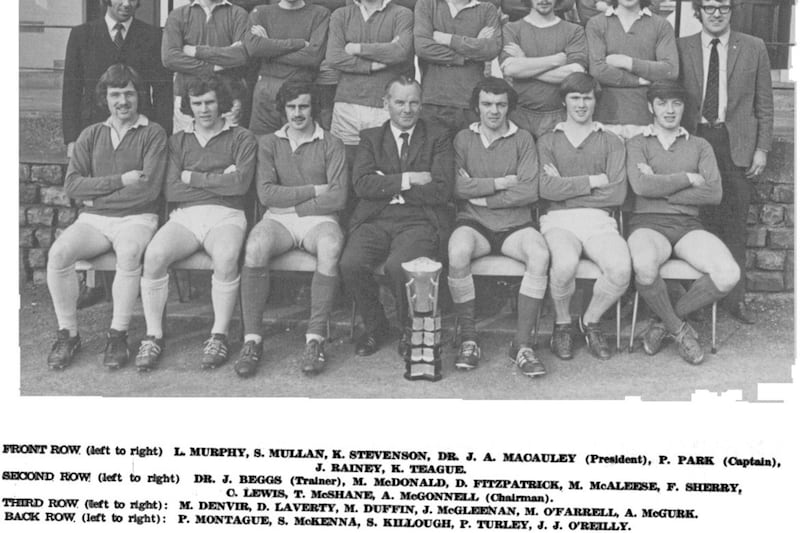BY the late 1960’s, revolution scented the air. Enraged by television images of state violence being visited upon civil rights protestors in America, the flame of resistance was well and truly lit in the north of Ireland.
The People’s Democracy was born in 1968; students from across the six counties joined the movement in droves.
That same year Tyrone teenager Paddy Park was about to embark on his studies at Queen’s University. Upon his arrival in Belfast, the Gaelic football club and the People’s Democracy were the first two things he signed up for.
“We played as much football as marching,” says Park, who went on to captain Queen’s to Sigerson glory in 1971.
“We would have marched regularly to the city hall. We’d gather at the Student Union and go down University Road. At Shaftesbury Square you had to get through the opposition and then the police would start into you. They were rough enough with you at that time.
“It was a period of ferment. When you’re younger you know these things are going on but it doesn’t hit you until later how lucky you were to actually survive. They were tumultuous times.
“It was tumultuous times all over the world.”
A runner-up in the MacRory Cup final with St Patrick’s Armagh in 1967, the Stewartstown Harps youngster was keen to test himself at Sigerson level.
University football came as a welcome distraction from the civil unrest that had gripped the city and beyond.
Since the competition’s inception in 1911, Queen’s managed to annex two Sigerson titles, in 1958 and ’64. On this day 51 years ago in Newry, the Belfast-based students were denied a hat-trick of crowns when they fell to University College Cork [UCC] in the final.
Twelve months later and against steep odds, Queen’s would go one better and avenge their loss to UCC, a team laced with marquee quality including Kerry brothers Brendan and Paudie Lynch, Cork’s Seamus Looney and the great 'Moss' Keane who went on to play rugby for Ireland.
Galbally Pearses man Jimmy Beggs won a Sigerson medal in ’64 under Paddy O’Hara’s tutelage before accepting the coaching reins at Queen’s from his mentor in 1971.
“We had a very good team at Queen’s but there was very low expectation that year for some reason,” Park recalls.
“We’d some very good footballers who weren’t necessarily county players but did shine.
“We had a tremendous coach in Jimmy Beggs. Jimmy was a major reason why we won Sigerson in ’71 because we were a team that wasn’t expected to do that well.”
Beggs, who later lectured at St Mary’s Teaching College for 30 years, has fond memories of winning the coveted silverware under O’Hara in ‘64, steamrollering UCD in a Casement Park decider, as well as playing alongside Down great Sean O’Neill - “a man among boys”, says the veteran coach.
Reflecting on Queen’s unlikely Sigerson victory in ’71, Beggs says: “We only had a couple of county players but they had a great will and determination to win. We were massive underdogs going down to Galway [for the finals weekend].”
The 78-year-old recalls Queen’s boasting better individual talent in subsequent seasons during his five-year reign – but the class of ’71 were always greater than the sum of their parts.
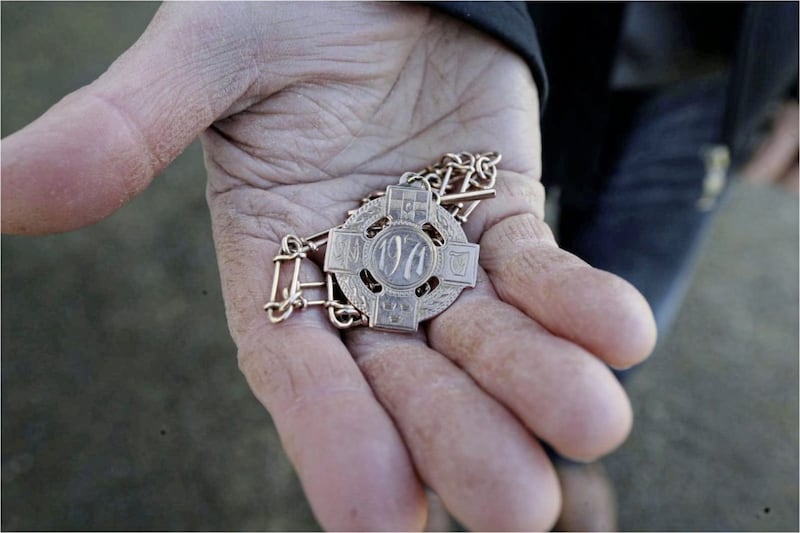
Dungiven clubman Liam Murphy, who played in the All-Ireland minor final for Derry in 1969, lined out for Queen’s at corner-back.
Murphy (69) went on to win back-to-back Ulster titles with the Derry seniors in 1975 and ’76 alongside double Allstar winner Anthony McGurk who was arguably Queen’s best player during the Lavey man’s time at the Belfast university.
Antrim’s Donal Laverty of Cargin was one of the most dynamic wing half-backs of his generation. Seamus Killough, an U21 All-Ireland winner with the Saffrons in 1969, was an uncompromising full-back on Beggs' all-conquering team.
Paddy Turley, an unused substitute in Down’s all-conquering 1968 team, was another vital cog. Maurice Denvir was knocking around Mourne panels too, while Tyrone men Paddy Park and Kevin Teague were enterprising forwards.
Finn Sherry and John Joe O’Reilly played inter-county football for Fermanagh, while Martin McAleese – husband of former President of Ireland, Mary – was also on the ’71 team and a very sharp operator.
The prospect of bringing the Sigerson Cup back to Belfast seemed a fanciful notion especially with hosts Galway, UCC and UCD deemed much better prospects than the northerners.
Maybe it was the fact that Jimmy Beggs had gotten the squad into tremendous physical condition for Sigerson weekend.
Maybe it was the fact that Queen’s didn’t have many county stars in their ranks, which seemed to be the way of many successful Sigerson teams.
Or maybe it was Liam Murphy’s brand new white boots he adorned that suggested to his team-mates and indeed the rest of the Sigerson contenders of '71 that the Queen’s boys hadn't travelled into the west just to make up the numbers.
Now living in Glasdrumman, Murphy laughs at his own youthful exuberance to go against the grain a little.
“God only knows what put it in my head,” he says.
“People ask you about certain aspects of that Sigerson final and the finer detail - but what I do remember was wearing a pair of white boots.
“I was also kicking the ball out because at that time our goalie – Ciaran Lewis – couldn’t kick it out. And I don’t think either of our other full-backs could kick it either, Seamus Killough and Malachy McDonnell (RIP).
“So I was given the job of kicking out the ball. I remember I got a bit of slagging about wearing the white boots!
“I used to buy all my boots in McGlade’s in Smithfield. Pat Doyle was the man there at the time, God rest him. It was always good craic going in to see Pat. He was a Liatroim, Co Down man.”
“The white boots were a new thing out at the time. Not many boys would have had them back then.”
Having been drawn against host college Galway in Saturday’s semi-final, Queen’s looked a beaten team in the first half as the Tribesmen raced into a six-point lead.
But Finn Sherry bagged a couple of goals to retrieve the game and Beggs’ men clung on for a surprise two-point victory.
In the other semi-final UCD had taken the scalp of UCC, but Sigerson wouldn’t be Sigerson without a player eligibility row.
Afterwards, UCC successfully protested that Louth footballer Benny Gaughran was no longer a student at UCD and consequently the Dublin-based students were dismissed from the competition, and UCC advanced to the final to face Queen’s the following day.
The UCD players turned up on the sideline with their jerseys draped over their shoulders and cheered on Queen’s.
“UCC were a star-studded team,” remembers Beggs.
“They had Paudie and Brendan Lynch from Kerry and the late ‘Moss’ Keane and Seamus Looney from Cork. They were stars, amazing footballers.”
Queen’s made a sprint start in the 1971 Sigerson final but were hauled back by five points from Kerry star Brendan Lynch.
Despite UCC’s scoring burst, Queen’s didn’t falter. They kept pace with the Cork students and, thanks to points from John Rainey and Martin McAleese, Queen’s drew level as the game entered the final 10 minutes.
“I remember it was a very rugged final. You never got anything easy in Sigerson football, particularly as a forward,” recalls Park, who lined out at wing-forward.
“Sigerson football was tough,” remembers Lavey man Anthony McGurk, who played a key role in Queen’s triumph in Galway.
“You had to play two games running in Sigerson weekend. It was the kind of football where the big stars rarely shone. There was a lot let go in it, let’s say.”
Beggs pushed McGurk into the Queen’s attack in search of the winning point. McGurk and Kevin Teague alternated between centre-forward and full-forward, which seemed to confuse UCC full-back ‘Moss’ Keane.
What followed was a moment of sheer bravery and audacity from Teague that won Sigerson for Queen’s in the closing stages (0-7 to 0-6).
Park recalls: “Kevin Teague is a great friend of mine and lives just down the road from me. He was at Armagh college with me as well.
“In the final minutes of that match and the game tied, I remember we lashed the ball into the full-forward line; I think Anthony McGurk had been moved into full-forward to maybe try and get possession, buy a free or get a score.
“Kevin was out on the right hand side and the ball broke to him. Big ‘Moss’ came out to him, there was a bit of a scrimmage and Kevin went under his legs and scrambled to get the ball as it was going towards the end line.
“He retrieved it, turned, got a bit of space and kicked this point over from a ridiculous angle. That was it. That was the winning point.”
The Queen’s players and their small band of supporters went ballistic at the final whistle as the club celebrated their third Sigerson title in seven years, despite being rank outsiders upon landing in Galway.
“UCC were a great side,” says Park, who raised the cup. “I just think we were a bit more intent on winning it.
“I’ll always remember the Galway university gave us great support, maybe it was the fact that things were bad in the north at the time. And I’ve abiding memories of the celebrations. Despite the amount of drink taken back at the hotel I can still remember ‘Moss’ Keane – a great fella off the pitch – in the middle of it. All the Cork boys drank with us afterwards. That was Sigerson. There was no bitterness.”
“There was a great spirit about that Queen’s team,” says Murphy, “they were never beaten until the final whistle. I played in subsequent Queen’s teams that were maybe more talented but didn’t win Sigerson.
“Of course, a very good UCD team came along (who won six out of seven Sigersons between 1973 and ’78). We won two Ryan Cups after '71 which I think we did well to do.
“Sigerson was winter football played in bad conditions. It was a great stepping stone from club football to county football. I was playing for Dungiven; we wouldn’t have been great at the time, certainly not threatening to win anything. So going from county minor to Sigerson with Queen’s to senior county football was great for me.”
The victorious Queen’s squad returned to Belfast on Monday night and gate-crashed a concert in Aquinas Hall.
Local heroes for a night.
Even though UCD virtually owned Sigerson in the 1970s, a gnawing regret of Beggs is that Queen's couldn’t get their hands on the silverware again before he bowed out in ’75.
Eleven years after their famous '71 feat, captain Seamus Boyd lifted the cup for Queen's.
“They were all characters in that ’71 team,” remembers Anthony McGurk.
“Liam Murphy was a great character, John Joe Reilly as well. Seamus Killough was a very good footballer. Even the people who ran the club at that time, the likes of Anthony McGonnell. They were great times.”
The foot and mouth outbreak in 2001 meant the class of ’71 had to delay their 30th anniversary dinner – which was later hosted by President Mary McAleese and Martin McAleese at Aras an Uachtarán.
Twenty-five years on, the global pandemic has put their 50th anniversary celebrations on ice.
Before the end of this year, they hope to get the chance to meet up again, reminisce about what they achieved 50 years ago, and remember absent friends and players Malachy McDonnell (RIP), Martin O’Farrell (RIP), Dan Fitzpatrick (RIP) and Brendan McKibbin (RIP).
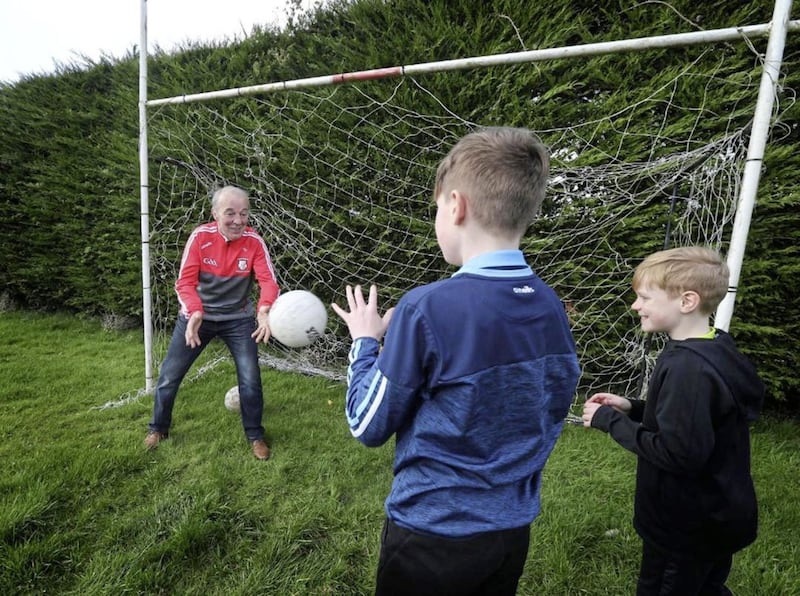
With the transient nature of university football, players came and went, pursuing different careers and taking what life had to offer – but the class of ’71 will be forever bound by their astonishing achievement in Galway all those years ago.
“Sometimes it doesn't feel like 50 years ago," says Park.
"Martin O’Farrell, who was a good friend of mine and also a teaching colleague, passed away some years ago. Another lad, Dan Fitzpatrick who would have kept goal and was also a teacher, has passed away too.
"And there was a lovely lad called Brendan McKibbin. At the start of that '71 season he died. It was an awful tragedy. I remember playing U21 against Brendan and he was a super player. He probably would have gone on to play for Down and he certainly would have figured on the Sigerson team had he been around.
“Winning Sigerson in '71 has to be the highlight of my career,” Park adds, “because I had the honour of captaining the team. There were players who were much better than me on that panel.
“I was probably in the right place at the right time. It was a privilege to be captain of those players. It was as good as I ever achieved.”
The Queen’s 1971 Sigerson-winning panel: Ciaran Lewis, Liam Murphy, Séamus Killough, Malachy McDonnell, Malachy Duffin, Maurice Denvir, Kevin Stevenson, JJ O’Reilly, Paddy Turley, Paddy Park, Kevin Teague, Finn Sherry, Martin McAleese, Anthony McGurk, John Rainey, Séamus Mullan, Donal Laverty, Martin O’Farrell, Terry McShane, John McGleenan, Seán McKenna, Dan Fitzpatrick, Peter Montague.
*******************
The class of 71 will never be forgotten - Jack Devaney
QUEEN’S GAA official Jack Devaney has described the Sigerson class of 1971 as the “real example of the band of brothers” – and says their famous achievement will never be forgotten by the university club.
Fifty years ago this month, Jimmy Beggs’ Queen’s team upset the odds to win the coveted silverware in Galway, following up on their previous successes of 1958 and ’64.
Queen’s defeated hosts Galway in the semi-final before overcoming a fancied UCC by a point in a nail-biting decider on March 7 1971, with Tyrone man Kevin Teague hitting the winning point against the star-studded Cork-based students.
The global pandemic means the club won’t be able to celebrate the team’s 50th anniversary in traditional fashion.
“These teams tended to be the real example of the band of brothers,” said Devaney, Chairman of Queen’s GAA Past Members’ Union.
“Some of them have maybe thought as time moves on their achievement has been forgotten but it certainly hasn’t.
“We’ve eight titles across the history of the university club. So none of those teams can be forgotten. Each in their own way set out the path for others to follow because of what those players and teams did.”
Queen’s might have been big underdogs ahead of the '71 Sigerson Cup weekend, but Beggs and the players always believed they had the fitness and togetherness to spring a surprise.
Devaney added: “When they went to Galway they went without any great expectation except what was in themselves.
“I still think today that when they were travelling down to Galway they felt that they could do something. It was against the odds but it’s what we tended to associate with a number of Sigerson Cup teams. It wasn’t always the teams with the litany of superstars that came through.”
